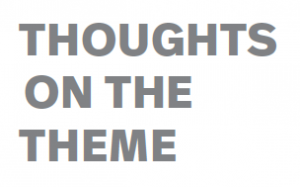The struggle for justice is the theme for this issue. For 30 years it has been embedded in the mission of Works in Progress and reflected in its pages.
Should the struggle for justice be hard? When something is “just” we see that it’s deserved or merited, and often we believe that what is just is right or fair.
But wait. When “just” morphs into “justice” it changes. It’s no longer simply something measured by how deserved or fair it is. Instead, “justice” is tied to the law: justice becomes the use of power to uphold what is lawful.
This tells us why the struggle for justice is hard and seemingly endless. Justice is a condition of the law. Since laws are made by and for the powerful, there is no reason to assume that their application will mean they are “just.”
No law was broken when police obtained a “no knock” warrant to storm Breonna Taylor’s apartment and shot the young woman to death. This was “lawful” but was it just? It would be “just”—merited or fair—for there to be consequences for the men who sought the warrant with skewed information, the men who stormed the apartment with insufficient warning; the men who fired 32 shots and killed Breonna Taylor.
So far there are no consequences. In Louisville and among questioning Americans elsewhere, the struggle for justice goes on.
In this issue of WIP, there’s a story about US Marshals and other “law enforcement” agencies shooting a suspect to death in Lacey. Killing Michael Reinhoel not only failed to meet the definition of “just,” it eliminated the possibility of “justice.” There will be no determination of whether Reinhoel deserved to be put to death even under the concept of justice tied to upholding the law.
Even that concept has morphed. It seems to refer simply to the use of power in the interests of the powerful. This, too, is evident in the legal response to Breonna Taylor’s death. The only consequence facing any of the police involved is a charge of wanton endangerment for the man who shot wildly into a neighboring apartment; a Class D Felony punishable by up to 5 years. In contrast, in Tennessee camping on public property is a Class E felony punishable by up to 6 years.
You can see the struggle against this evolution toward the unconstrained exercise of power in our special section covering 30 years of WIP (pages 7-10)..The centerfold reveals an amazing array of activist contributions to the life of our community and beyond. We’re happy that all issues from 1990 onward are archived at the University of Washington because they show the powerful resistance from below and how it has helped to shape our world.
In this issue, we’ve summarized citizen resistance over time to Olympia’s housing policies and the way the City’s decisions contribute to the persistence of homelessness, along with use of our public port for private purposes.
Also in this issue, we’re reminded of Ruth Bader Ginsberg, a “justice” who applied the law not to serve the most powerful but in the cause of fairness. On page 12, read about Larry Jefferson, another individual who has found a way to make things more just while working in the criminal justice system. Stories like the Haki Farmers Collective, Skokomish Farm and “Setting the bar higher” in Grays Harbor describe the search for a way of life that is “just,” and does not depend on the exercise of power. Bob Vadas’ critical review of Olympia’s urban zoning plans is only the latest to track resistance to continuous attempts by the City to sacrifice communities to the demands of developers. The article about attempts to reinterpret a special taxing district law in order to indebt people in behalf of Black Lake recreational interests. It is another illustration of how power is used not to uphold the law, but to impose the interests of the powerful.. —BW
In the coming months
November-December. “What is political?”
If political activity is only activity around elections, we’re in trouble, especially if people in positions of power decide that they can nullify the election. Sometimes it seems that our politically elected officials have too much power—but then we look at how corporations shape our lives; at how their attempts to rein in the police are rejected, and wonder if they have enough. Democracy may not exist, but we’ll miss it when it’s gone. What are your experiences in the “political” realm? Plus this is the issue we’ll be publishing after the election—assuming there is one and we actually know the result. Deadline for this 2-month issue is later than usual so you have more time! Most submissions due October 25. Commentary on the election due November 6.
January. What we can’t face.
Since we should know in January who will be the president for the next four years, this theme might be relevant to that. But our thought originally was to encourage submissions that talk about what we avoid dealing with and how we overcome that. Deadline December 13.
February. Time. This is a topic that has a million possibilities. Please take advantage of them. Deadline January 16.

Be First to Comment